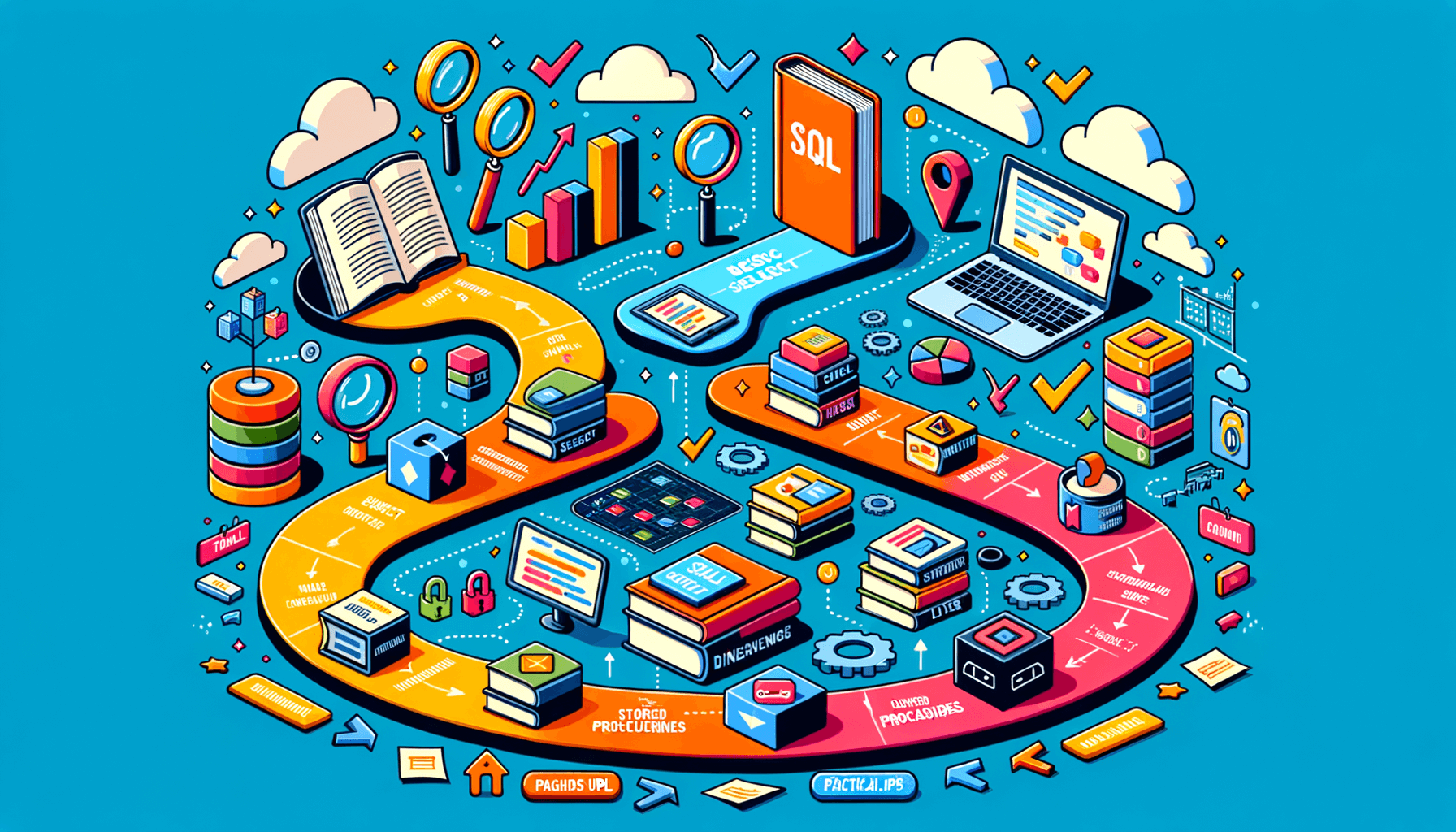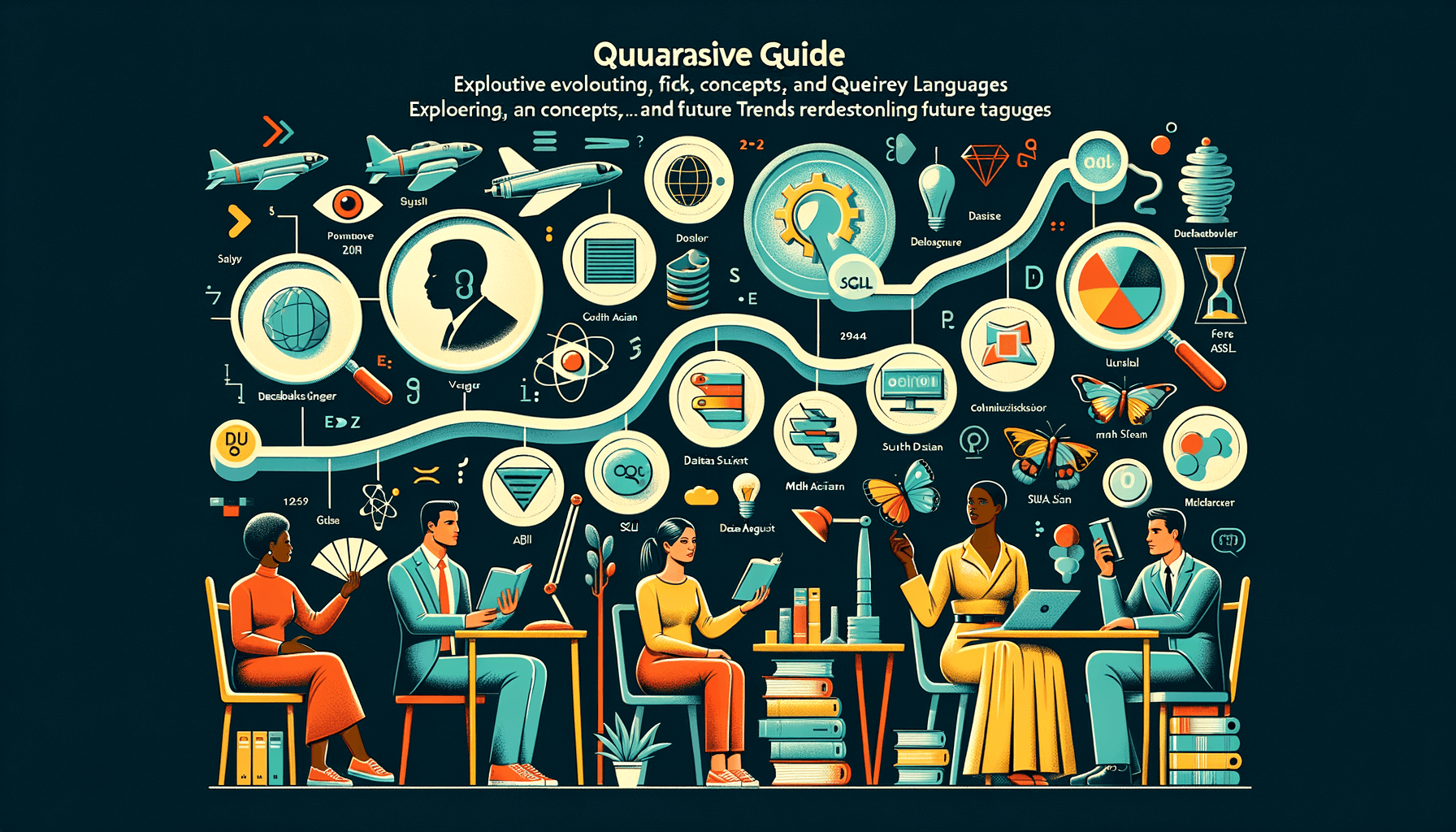A big variety of articles and resources

What are best ways to learn SQL?
 Sia Author and Instructor
Learn SQL
Sia Author and Instructor
Learn SQL
13 minute read
Learning SQL can open many doors in the tech world. Whether you want to manage databases, analyze data, or build applications, SQL skills are a must. This article will guide you through the best ways to learn SQL, from understanding the basics to mastering advanced topics.
Key Takeaways
- Start with understanding basic SQL concepts and terminology.
- Choose the right learning resources like books, online courses, and interactive platforms.
- Practice SQL through hands-on exercises and real-world projects.
- Join SQL communities and forums to learn from others and stay updated.
- Consider getting SQL certifications to validate your skills and improve job prospects.
Understanding the Basics of SQL
Key Concepts and Terminology
To start with SQL, we need to understand some key concepts and terms. SQL stands for Structured Query Language, and it's used to manage and manipulate databases. Databases are organized collections of data, and SQL helps us interact with this data. We often deal with tables, which are made up of rows and columns. Each row represents a record, and each column represents a field in that record.
Importance of Relational Databases
Relational databases are crucial because they allow us to store data in a structured way. This structure makes it easier to retrieve and analyze data. In a relational database, data is stored in tables, and these tables can be linked to each other through relationships. This linking helps us avoid data duplication and maintain data integrity.
Introduction to SQL Syntax
SQL syntax is the set of rules that defines how we write SQL statements. These statements are used to perform tasks such as querying data, updating records, and creating tables. Some common SQL commands include SELECT, INSERT, UPDATE, and DELETE. Each command has a specific purpose and follows a particular structure. For example, the SELECT statement is used to retrieve data from a database, and it typically looks like this:
SELECT column1, column2 FROM table_name WHERE condition;
Understanding the basics of SQL syntax is essential for anyone looking to work with databases. It forms the foundation for more advanced SQL topics and techniques.
Choosing the Right Learning Resources
Books and Textbooks
Books and textbooks are a great way to learn SQL. They offer detailed explanations and examples. Some popular books include "SQL for Dummies" and "Learning SQL" by Alan Beaulieu. These resources can help you understand the basics and more advanced topics.
Online Courses and Tutorials
Online courses and tutorials are very convenient. They allow you to learn at your own pace. Websites like Coursera, Udemy, and Jumpstart SQL offer free introductory lessons with hands-on projects and personalized support. These courses often include video lectures, quizzes, and assignments to help you practice.
Interactive Learning Platforms
Interactive learning platforms make learning SQL fun and engaging. Websites like Codecademy and Khan Academy offer interactive lessons where you can write and run SQL queries directly in your browser. These platforms provide instant feedback, which helps you learn from your mistakes and improve your skills.
Choosing the right learning resources is crucial for mastering SQL. Whether you prefer books, online courses, or interactive platforms, there are many options available to suit your learning style.
Hands-On Practice and Exercises
Setting Up a Local Environment
To start practicing SQL, we need to set up a local environment. This involves installing a database management system (DBMS) like MySQL or PostgreSQL on our computer. Having a local setup allows us to experiment freely without any restrictions. We can also use tools like Docker to create isolated environments for different projects.
Working with Sample Databases
Once our environment is ready, we can begin working with sample databases. These databases provide a variety of data to practice on, helping us understand different SQL concepts. Popular sample databases include Sakila for MySQL and Pagila for PostgreSQL. By running queries on these databases, we can see how SQL works in real-world scenarios.
Common SQL Practice Problems
Practicing SQL problems is essential for mastering the language. We can find many practice problems online that cover a wide range of topics, from basic queries to complex joins. Solving these problems helps us improve our skills and prepares us for real-world tasks. Some websites even offer interactive platforms where we can write and test our SQL queries directly.
Utilizing SQL in Real-World Projects
Integrating SQL with Programming Languages
When we integrate SQL with programming languages, we can create powerful applications. For example, using SQL with Python or JavaScript allows us to manage and query databases efficiently. This combination is essential for building dynamic web applications and data-driven projects.
Building Data-Driven Applications
Creating data-driven applications involves using SQL to handle large amounts of data. We can use SQL to store, retrieve, and manipulate data, making our applications more robust and reliable. Mastering SQL techniques for database management is crucial for any developer working on such projects.
Case Studies of SQL in Industry
In the industry, SQL is used in various ways. For instance, e-commerce platforms use SQL to manage product inventories and customer data. Financial institutions rely on SQL for transaction processing and reporting. These real-world examples show the importance of SQL in different sectors.
By understanding how SQL is applied in real-world scenarios, we can better appreciate its value and potential in our projects.
Advanced SQL Topics
Complex Queries and Joins
In this section, we dive into the world of complex queries and joins. These are essential for extracting meaningful information from multiple tables. Mastering these techniques allows us to handle more sophisticated data retrieval tasks. We will explore different types of joins, such as inner joins, outer joins, and cross joins, and understand their use cases.
Stored Procedures and Functions
Stored procedures and functions are powerful tools in SQL that help us automate repetitive tasks and encapsulate business logic. By using these, we can improve the efficiency and maintainability of our database operations. We will learn how to create, modify, and execute stored procedures and functions, and discuss their advantages and limitations.
Performance Optimization Techniques
Optimizing SQL queries is crucial for ensuring that our databases run smoothly and efficiently. In this part, we will cover various performance optimization techniques, including indexing, query optimization, and proper schema design. Understanding these techniques helps us to reduce query execution time and improve overall database performance.
Advanced SQL topics are essential for anyone looking to deepen their understanding of database management and enhance their data handling skills.
Participating in SQL Communities and Forums
Online SQL Communities
Joining online SQL communities can be a great way to learn and grow. These communities offer a space to ask questions, share knowledge, and connect with others who are also learning SQL. Being part of a community can provide support and motivation as you work through challenges and celebrate successes.
Attending SQL Meetups and Conferences
Attending meetups and conferences allows us to meet other SQL enthusiasts in person. These events often feature talks from experts, workshops, and networking opportunities. They can be a great way to learn about new trends and tools in the SQL world. Plus, they offer a chance to see how SQL is used in different industries.
Collaborating on Open Source Projects
Working on open source projects can be a valuable experience. It allows us to apply our SQL skills to real-world problems and collaborate with others. This can help us learn new techniques and improve our coding practices. Additionally, contributing to open source projects can be a great way to build a portfolio and gain recognition in the SQL community.
Participating in SQL communities and forums can greatly enhance our learning experience. By engaging with others, we can gain new insights, find support, and stay motivated on our SQL journey.
Leveraging SQL Certifications
Popular SQL Certification Programs
There are several well-known SQL certification programs available. These certifications can help us validate our skills and knowledge in SQL. Some popular ones include Microsoft Certified: Azure Data Fundamentals, Oracle Database SQL Certified Associate, and IBM Certified Database Associate. Each of these programs offers a different focus, so we can choose the one that best fits our career goals.
Benefits of Certification
Earning an SQL certification can open many doors for us. Certified professionals often have better job prospects and higher salaries. Additionally, certifications can help us stand out in a competitive job market. They also provide a structured learning path, ensuring we cover all essential topics.
Preparing for Certification Exams
Preparation is key to passing SQL certification exams. We should start by reviewing the exam objectives and focusing on areas where we need improvement. Using study guides, practice tests, and online resources can be very helpful. Some platforms even offer a mini course to help us get started. It's also beneficial to join study groups or forums where we can discuss topics and share resources with others preparing for the same exam.
By investing time in earning an SQL certification, we not only enhance our skills but also increase our value in the job market. This can lead to better job opportunities and career growth.
Exploring SQL Tools and Software
Database Management Systems
When we talk about SQL, we can't ignore the importance of Database Management Systems (DBMS). These systems help us store, manage, and retrieve data efficiently. Some popular DBMS include MySQL, PostgreSQL, and Microsoft SQL Server. Each of these has its own strengths and is suited for different types of projects.
SQL IDEs and Editors
To write and test SQL queries, we need good Integrated Development Environments (IDEs) or editors. Tools like SQL Server Management Studio (SSMS), DBeaver, and DataGrip offer features like syntax highlighting, code completion, and query debugging. These tools make our work easier and more efficient.
Data Visualization Tools
Once we have our data, we often need to visualize it to make sense of the numbers. Tools like Tableau, Power BI, and Looker help us create charts, graphs, and dashboards. This makes it easier to understand trends and patterns in the data. Visualizing data can turn complex datasets into easy-to-understand insights.
Using the right tools can significantly improve our productivity and the quality of our work. Choosing the right software depends on our specific needs and the nature of our projects.
Staying Updated with SQL Trends and Developments
Following SQL Blogs and News
To stay current with SQL, we should regularly check out a blog page on sqlskillz.com. This site features SQL tutorials, tips, and insights. It's a great place to learn SQL for beginners with articles, videos, and resources. We can subscribe for updates and compare resources to keep our knowledge fresh.
Subscribing to SQL Newsletters
Another way to stay informed is by subscribing to SQL newsletters. These newsletters often include the latest news, trends, and best practices in the SQL world. They are a convenient way to get updates directly in our inbox.
Engaging with Thought Leaders in SQL
We should also follow thought leaders in the SQL community. These experts often share valuable insights and updates on social media and their personal blogs. Engaging with their content can provide us with a deeper understanding of SQL trends and developments.
Staying updated with SQL trends helps us improve our skills and stay competitive in the job market.
Teaching and Mentoring Others in SQL
Becoming an SQL Instructor
Teaching SQL can be a rewarding experience. We can start by sharing our knowledge through workshops or online courses. For instance, an introduction to SQL course offers hands-on SQL training with industry insights. This can be a great way to help others learn while also reinforcing our own skills.
Creating Educational Content
Creating educational content is another effective way to teach SQL. We can write blog posts, create video tutorials, or even develop full-fledged courses. Instructor Eric Vanier specializes in database performance and optimization, and his approach can serve as a model for us. By breaking down complex topics into simple, digestible pieces, we can make learning SQL accessible to everyone.
Mentoring Beginners in SQL
Mentoring beginners is a fulfilling way to give back to the community. We can offer one-on-one sessions, group workshops, or even online forums where newcomers can ask questions and get guidance. This not only helps them but also keeps us sharp and up-to-date with the latest SQL trends.
Mentoring and teaching SQL not only benefits the learners but also enhances our own understanding and keeps us engaged with the latest developments in the field.
Teaching and mentoring others in SQL can be a rewarding experience. Whether you're a beginner or looking to refine your skills, our courses are designed to help you succeed. Visit our website to explore our course catalog and find the perfect fit for your learning journey. Sign up today and start advancing your SQL knowledge!
Conclusion
Learning SQL can seem hard at first, but with the right methods, anyone can master it. Start with the basics and build a strong foundation. Use online courses, books, and practice exercises to improve your skills. Don't forget to join communities and forums where you can ask questions and share knowledge. Practice regularly and work on real-world projects to apply what you've learned. With patience and persistence, you will become good at SQL and open up many new opportunities.
Frequently Asked Questions
What is SQL?
SQL stands for Structured Query Language. It's a language used to communicate with databases and manage data.
Why should I learn SQL?
Learning SQL is important because it helps you handle and analyze data, which is a valuable skill in many jobs today.
What are relational databases?
Relational databases store data in tables that are linked to each other. This makes it easier to organize and retrieve data.
Where can I find good resources to learn SQL?
You can learn SQL from books, online courses, and interactive learning platforms. Each has its own way of teaching, so try a few to see what works best for you.
What is the best way to practice SQL?
The best way to practice SQL is by setting up a local environment and working with sample databases. You can also solve common SQL problems to improve your skills.
How is SQL used in real-world projects?
SQL is used to integrate with programming languages, build data-driven applications, and analyze data in various industries.
Are there advanced topics in SQL?
Yes, advanced topics include complex queries, stored procedures, and performance optimization techniques. These help you handle more complicated tasks.
What are SQL certifications?
SQL certifications are programs that test your knowledge of SQL. They can help you prove your skills to employers and advance your career.







